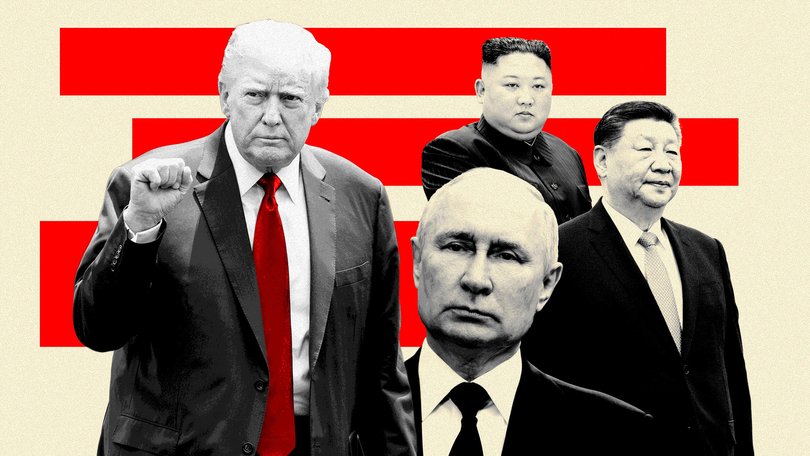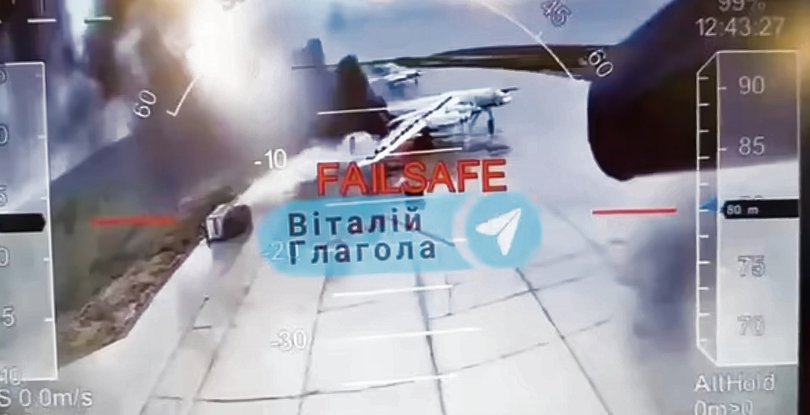Polls show Aussies back Ukraine peacekeeping efforts, don’t trust US President Donald Trump
Nearly three-quarters of Australians overwhelmingly support contributing to a peacekeeping mission in Ukraine, polling says and more than half back raising defence spending.

Nearly three-quarters of Australians overwhelmingly support contributing to a peacekeeping mission in Ukraine, polling says and more than half back raising defence spending.
The same survey showed trust in the United States plummeted to a record low of 36 per cent, with Australians ranking US President Donald Trump just above the authoritarian leaders of China, Russia and North Korea.
Australians’ trust in the US dropped 20 points from last year’s survey and 53 per cent compared to 2011, when US President Barack Obama was president.
Sign up to The Nightly's newsletters.
Get the first look at the digital newspaper, curated daily stories and breaking headlines delivered to your inbox.
By continuing you agree to our Terms and Privacy Policy.The research was conducted for the Lowy Institute and assessed in April how voters felt about Australian troops joining a European-led Coalition of the Willing if any ceasefire is agreed.
Despite President Trump boasting that he would end the war as soon as he was re-elected, he has failed to force Vladimir Putin to agree to a ceasefire or negotiate.
But leaders are exploring ways to safeguard Ukraine if any deal is brokered, with NATO membership taken off the table for now.
The formerly-occupied Soviet Baltic states have been some of Ukraine’s strongest supporters within Europe and have been proposing Western boots on the ground in Ukraine.
The proposal for Australian involvement in a potential Western troop deployment to Ukraine was first flagged by Estonia’s Foreign Minister Margus Tsahkna in an exclusive interview last December.
This year, Prime Minister Anthony Albanese said he was open to Australian involvement in a Coalition of the Willing when it was formally proposed by UK Prime Minister Keir Starmer and France’s President Emmanuel Macron. President Macron has long advocated European troops on the ground but had failed to gather much international or European support until the British jointly backed the idea.
The concept of a Coalition of the Willing remains nebulous and has resulted in several virtual calls to assess what interested world leaders might contribute.
But Australian involvement was strongly opposed by former Coalition leader Peter Dutton before his wipeout election defeat in May. Andrew Hastie, who was shadow defence minister at the time, later revealed that the Coalition had got it wrong and that the position was not one he supported but had been adopted by Mr Dutton who did not consult his frontbench.
The Nightly can reveal that under new Liberal leader Sussan Ley, the Coalition will constructively consider any formal request if made of Australia, opening the way for any mission to have bipartisan backing.
The polling also found that Australians rated Ukraine’s President Volodomyr Zelensky amongst the top five world leaders to do the right thing when it came to world affairs.

By contrast, Donald Trump, who, along with his Vice-President JD Vance, tore strips off President Zelensky in the Oval Office, was rated just above China’s President Xi Jinping, Russia’s Vladimir Putin and North Korea’s Kim Jong-un alongside a 20 per cent drop in trust towards the United States.
The findings underscore the difficult dynamics ahead of Prime Minister Anthony Albanese’s first bilateral meeting with President Trump scheduled to take place on the sidelines of the G7 in Canada on Tuesday.
Peter Tesch, former Australian Ambassador to Russia, told The Nightly that the results were encouraging.
“These heartening results show Australians understand what’s at stake in Putin’s brutal war of choice in Ukraine,” Mr Tesch said.
“The reverebrations of this war echo in our region, through the collusion between the DPRK and China to support Pruin’ts illegal aggression.
“Ukraine has demonstrated resolve and resilience, so Ukraine has shown it is capable.
“Through it’s recent bold strikes against military targets deep in the Russia’s heartland, Ukraine has shown that this is not putin’s war to win, and we and other nations committed to the rule of law should continue to back Ukraine.”
Ukraine’s President Volodomyr Zelensky seized on the success of Operation Spiderweb, in which Ukraine managed to smuggle drones deep inside Russia to destroy and nuetralise
Meanwhile, Volodymr Zelensky urged countries to weaponise drones following the spectacular success of operation spiderweb, in which Ukraine smuggled drones into Russia and destroyed 41 aircraft, to urge nations to innovate their own weapons.
Ukraine’s President was speaking in a keynote address to the central European security conference GLOBSEC, hosted by the Czech government in Prague and moderated by The Nightly.
“Probably no-one in this room missed it,” President said of the daring Operation Spiderweb drone attack staged at multiple Russian airbases earlier this month.
“It clearly shows how the technologies of war are changing.
“Ten years ago such a strike would have been unimaginable.
“Today, we can’t even imagine what kind of strikes a country might be able to carry out ten years from now.
“But one principle is clear, no country can stay behind in technological development when it comes to security.”
Ukraine has used drones on land, in the air and underwater, with repeated stunning successes during the course of the full-scale war which Putin began in Feburary 2022.
Ukraine has no conventional navy but has managed to use drones to sink Russian warships in the strategically important Black Sea. Ukraine has sunk or damaged between a quarter or a third of Russia’s Black Sea Fleet.

President Zelensky said that Ukraine had ability to build 40 per cent more drones than it was currently producing.
“Our factories have the capacity, what we lack is financing,” he said.
“This must be addressed.
“And I urge your countries to treat drones production with the same urgency and attention that we do.
“We must all be faster in drones than our enemies.”
Chen Ming-chi, Taiwan’s Deputy Foreign Affairs Minister, told the GLOBSEC forum that Taiwan considered Ukraine as standing “at the forefront of safeguarding democracy.”
He said he feared a possible “Crimea moment,” likening China’s aggressive behaviour and increased military drills around Taiwan to Mr Putin’s illegal annexation of Crimea in 2014, that went largely unpunished by the West.
He said Taiwan was preparing, by raising defence spending and intensifying conscription measures to make the training more practical rather than theoretical.
Last week, NATO boss Mark Rutte announced that he expected allies would raise their defence spending to 5 per cent of GDP, including 3.5 per cent on core defence needs and a further 1.5 per cent on defence-related infrastructure.
Chen Ming-chi described this figure as a “tall order.”
“But our president just announced this year that Taiwan pledged to spend at least three per cent of our GDP on defence,” he said.
“This is a call to all the countries in the free world.
“If you want peace you have to prepare for war, so investing and budgeting is the number one issue. “
The Lowy polling found that 51 per cent of Australians backed higher defence spending.
Australia’s defence spending is not expected to reach 2.3 per cent of GDP until the 2030s, a level that may have contributed to the Pentagon review into whether AUKUS should be scrapped.
